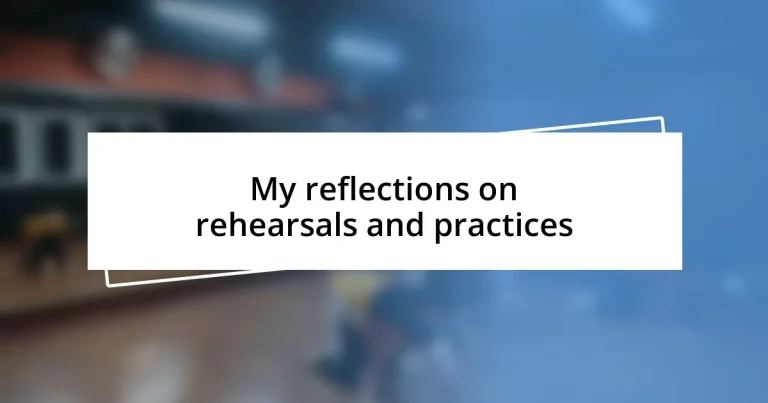Key takeaways:
- Rehearsal techniques boost confidence, reduce anxiety, and enhance teamwork through targeted practice and collaboration.
- Regular practice fosters skill mastery, mental clarity, and deeper connections with fellow performers.
- Incorporating structured schedules, varied techniques, and constructive feedback improves rehearsal effectiveness and encourages creativity.
- A mindset shift from perfectionism to exploration can transform rehearsals into supportive, growth-oriented experiences.
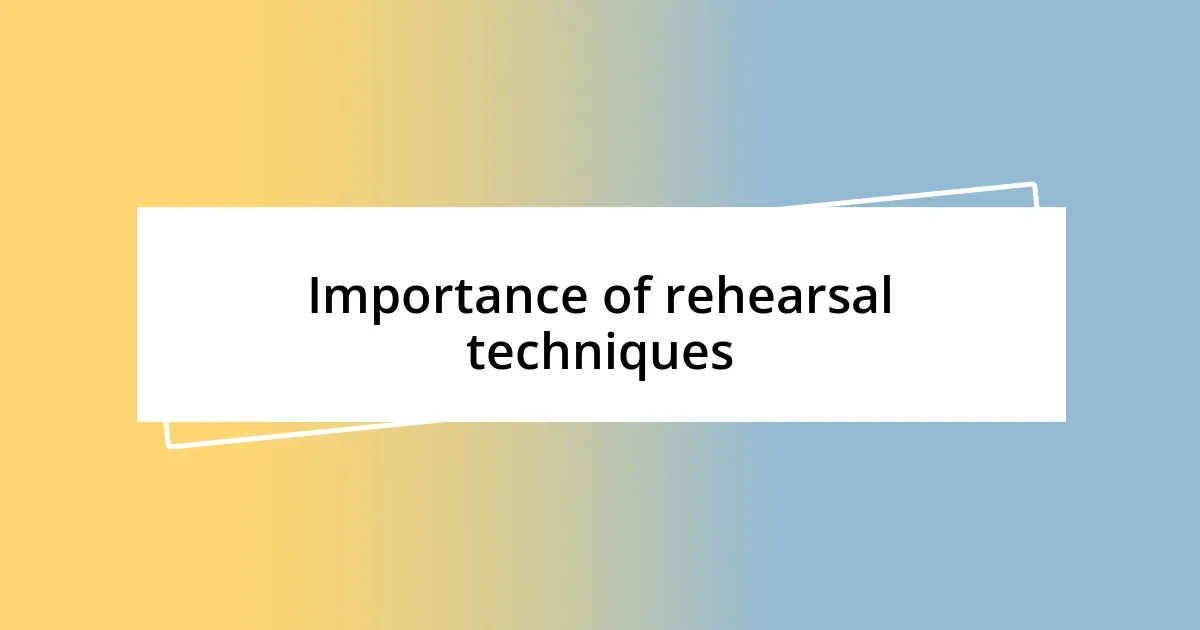
Importance of rehearsal techniques
Rehearsal techniques are vital not just for mastering the material, but for building confidence and reducing anxiety. I remember a time during a big performance when I felt overwhelmed. It was only through rigorous rehearsal techniques that I learned to channel that anxiety into energy, transforming my performance into something memorable. Have you ever felt the difference between going in cold versus being fully prepared? That preparation can make all the difference.
One overlooked aspect of rehearsal techniques is their ability to foster teamwork and collaboration. When I practiced with my fellow performers, I often noticed how our chemistry evolved. We were not just rehearsing lines; we were building trust and learning to rely on one another. Isn’t it fascinating how just a few practice sessions can create such a strong bond among teammates?
Additionally, focusing on specific techniques allows for targeted improvement. I once struggled with a complex scene, feeling stuck in my approach. But by breaking it down and using various rehearsal methods, I was able to pinpoint exactly where I was faltering. This kind of proactive problem-solving is crucial. Wouldn’t you agree that being able to identify and fix issues during rehearsal leads to a more polished final product?
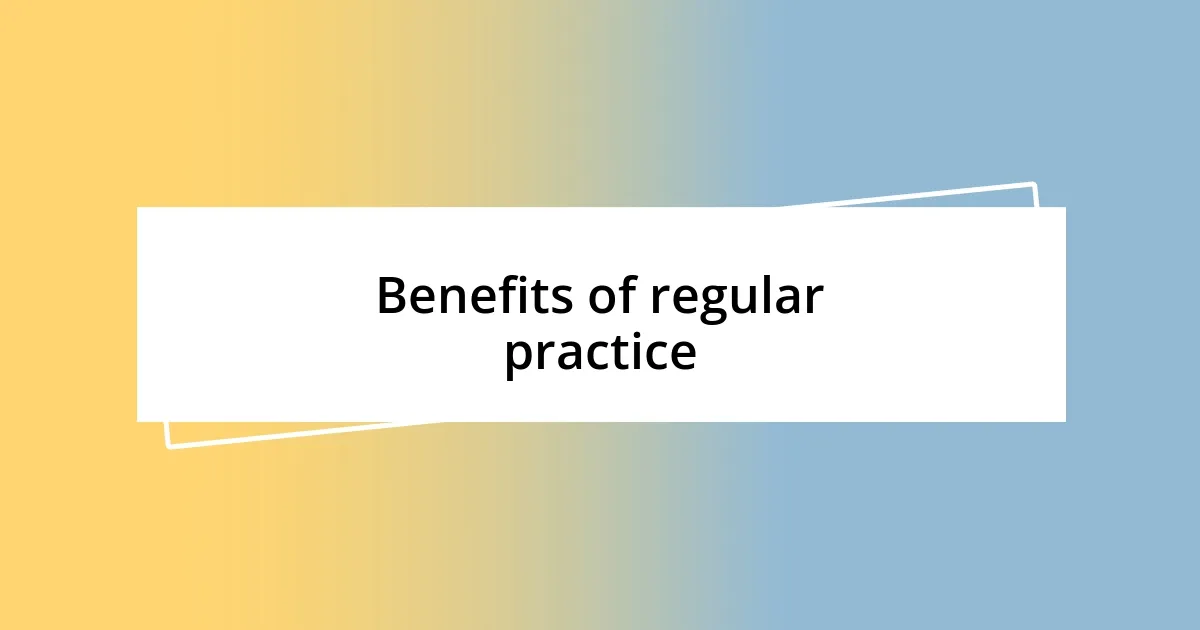
Benefits of regular practice
Regular practice is the backbone of any performance, elevating not just skill, but also mental clarity. I vividly recall a pivotal moment during rehearsals for a challenging piece where repeated practices allowed me to develop muscle memory. This experience illuminated just how important it is to create a strong foundation—feeling that internal connection during a performance truly transforms the experience.
The benefits of regular practice include:
- Enhanced skill mastery, making complex tasks feel instinctive.
- Increased confidence levels, helping quell performance anxiety.
- Improved physical endurance, enabling longer and more demanding performances.
- A deepened sense of connection with fellow performers, enriching the overall experience.
- The ability to adapt quickly to changes, whether in script or performance style.
In my own journey, each of these elements has played a crucial role. It’s remarkable how that commitment to practice permeates through every aspect, creating a sense of assurance that is difficult to describe—but easy to feel on stage.
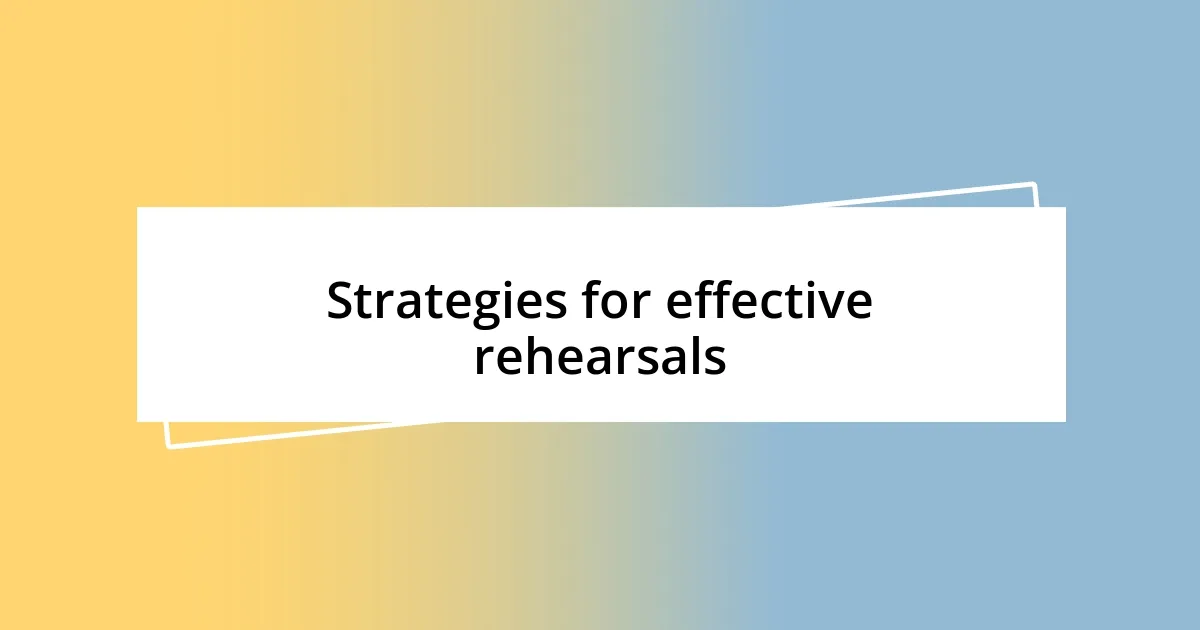
Strategies for effective rehearsals
To make rehearsals effective, I believe creating a structured schedule is essential. Planning specific times for each session not only keeps everyone on track but also builds accountability within the group. I recall a time when we set aside certain afternoons simply for warm-ups and blocking exercises. The predictability really helped us delve deeper into our roles and understand the nuance we sometimes miss in spontaneous practices. Have you ever noticed how structure can turn chaos into creativity?
Another strategy I’ve found valuable is the use of varied rehearsal techniques. Mixing methods—like tables reads, movement exercises, and even role-swapping—can ignite fresh ideas and solutions. I once took part in a session where we switched characters, which not only deepened our understanding of each other’s roles but also unveiled layers we hadn’t considered. This approach keeps the process dynamic and could enhance the overall performance. Doesn’t it feel invigorating to break the mold now and then?
Lastly, integrating feedback sessions into rehearsals dramatically increases their effectiveness. I remember a rehearsal where, instead of just jumping into scenes, we took a few minutes to discuss what worked and what didn’t. The honest conversations that emerged helped us collectively improve and foster a safe space for experimentation. How does your group handle constructive criticism? Embracing feedback can truly turn good performances into great ones.
| Strategy | Description |
|---|---|
| Structured Schedule | Establishing predictable rehearsal times fosters accountability and structure, enhancing focus. |
| Varied Techniques | Incorporating different rehearsal methods can lead to greater creativity and deeper character understanding. |
| Feedback Sessions | Integrating reflection and discussion helps refine performances, creating an environment of continuous improvement. |
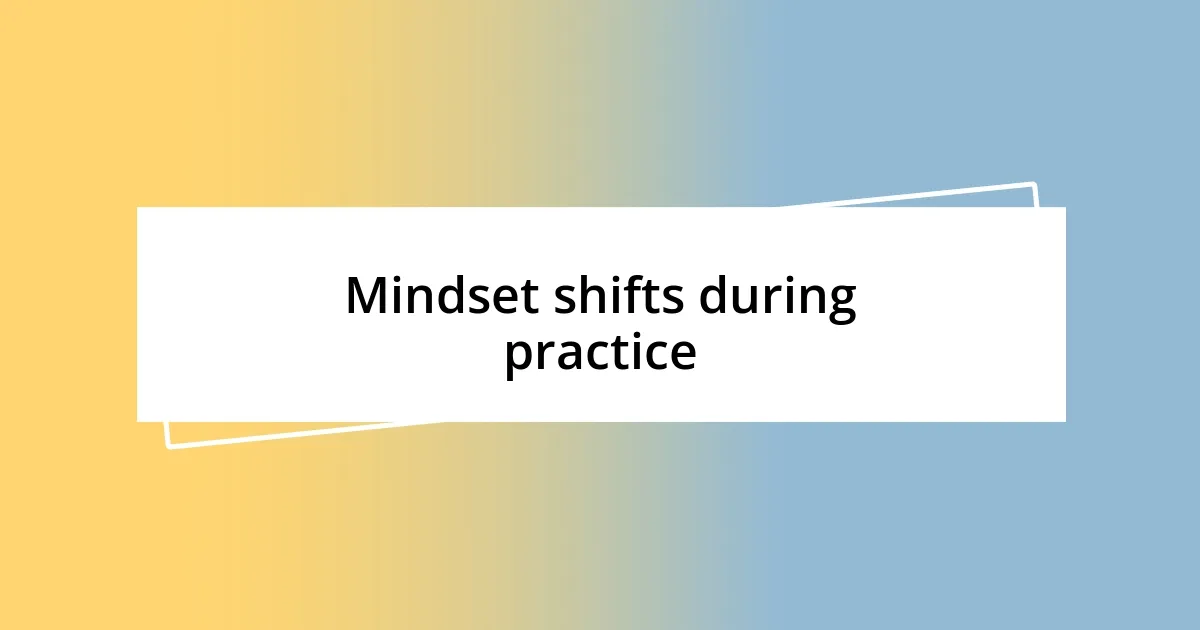
Mindset shifts during practice
Mindset shifts during practice can be quite profound. I remember one rehearsal where I approached the beginning with trepidation, feeling the weight of expectations. However, as we warmed up, I consciously shifted my perspective from one of performance to pure exploration. Embracing the idea that mistakes were merely stepping stones transformed the session into a collaborative adventure, releasing the pressure I had put on myself.
There are moments when I feel the difference between practicing to achieve perfection versus practicing to embrace the process. I recall a time when a fellow performer reminded me that every rehearsal is an opportunity to learn, not just to execute. This simple shift from a results-oriented mindset to one of growth opened up my creativity. Have you ever found yourself caught in the need to get it “right”? Letting go of that urgency has been liberating, allowing me to simply enjoy the act of creation.
Sometimes, a shift in mindset can come from unexpected sources. In a particularly challenging rehearsal, a director shared a story about their own struggles, allowing us all to relate to the vulnerability of the performance journey. That moment of shared humanity reminded me that we’re all in this together. It sparked a realization: embracing our imperfections can be incredibly unifying. How do you handle vulnerability in your practice? Acknowledging it has, for me, transformed our rehearsals into a supportive community, where we uplift rather than judge each other.
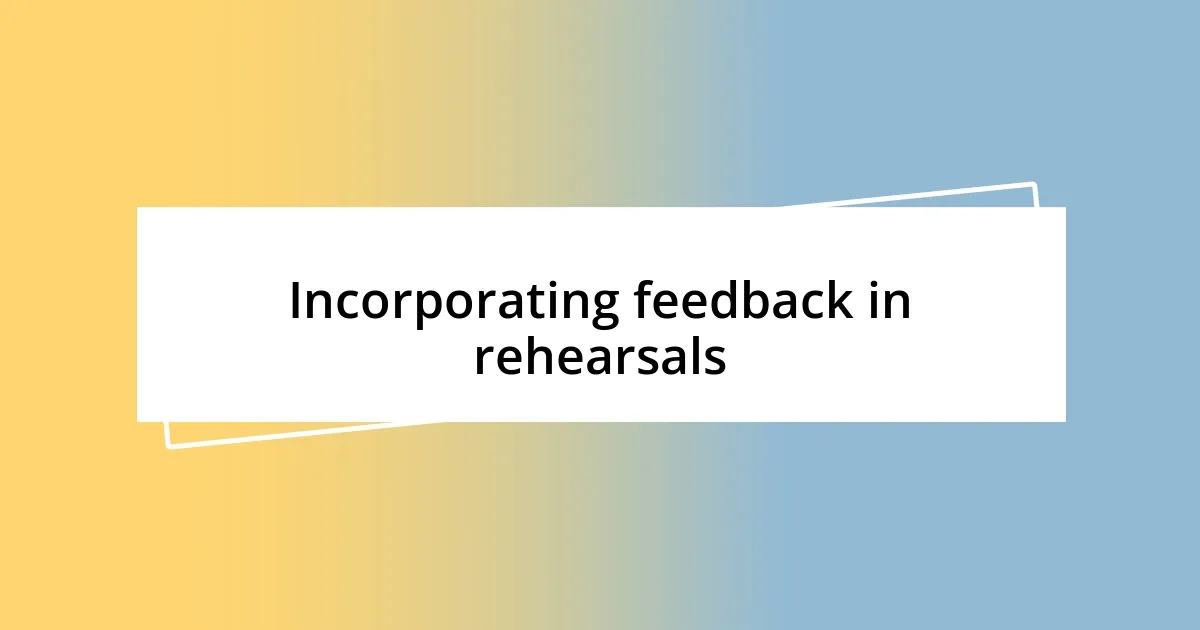
Incorporating feedback in rehearsals
Incorporating feedback during rehearsals has been a game changer for me. I vividly remember a session where we paused after each scene to share our thoughts. This wasn’t just about what went well; it was also about identifying areas for improvement. That open dialogue made me realize how much insight others could offer. Have you ever experienced that moment when someone else’s perspective changes the way you view your own performance?
One rehearsal stands out: a fellow actor pointed out a subtlety in my delivery that I hadn’t even considered. Because of the feedback, I adjusted my approach and saw immediate improvement. It felt refreshing to have that layer of support, knowing we were all there to help each other shine. I find that when feedback flows freely, it nurtures an environment where creativity can thrive. Isn’t it fascinating how collaboration can elevate individual performances?
I’ve also learned that feedback is best received when delivered positively. In one rehearsal, our director emphasized the importance of framing criticism constructively. Instead of saying “this part doesn’t work,” they would highlight what they loved first, then suggest improvements. This method allowed me to stay motivated and open to change rather than feeling defensive. Have you ever thought about how delivery can alter your response to feedback? Understanding this has transformed my approach to receiving critique—turning it from a source of anxiety into one of inspiration.
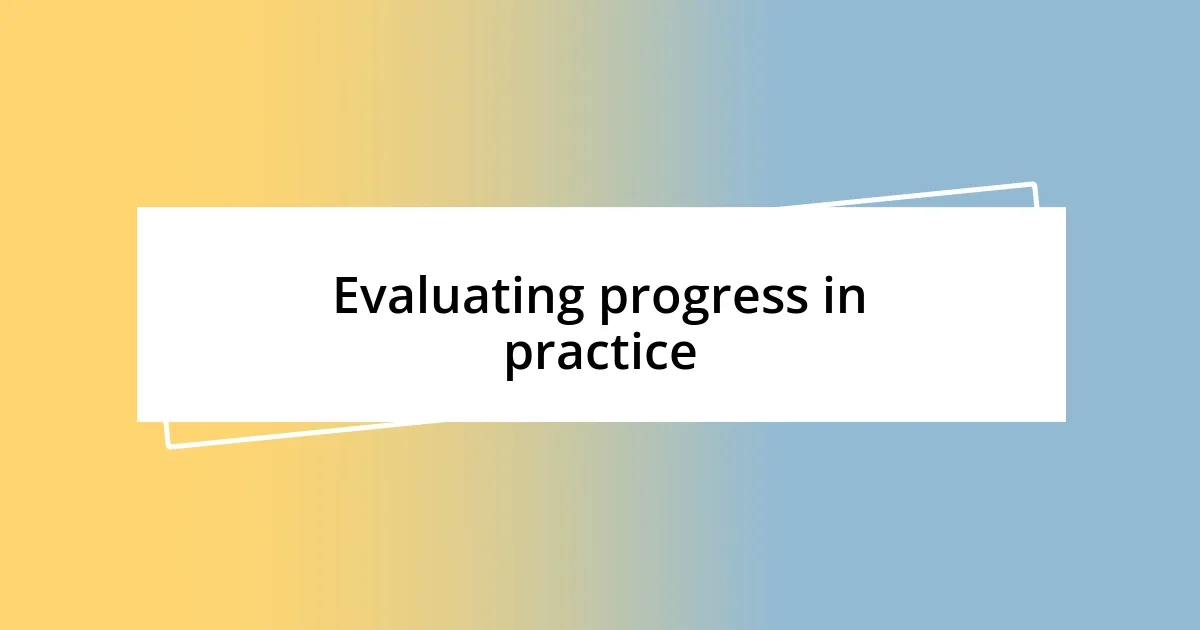
Evaluating progress in practice
Evaluating progress in practice is essential for growth. I recall a recent rehearsal where I took a moment to reflect on my performance with the team. We set a timer for five minutes, sitting in a circle to discuss what we felt had shifted. It was surprising to hear how much we had all developed, even in just one week. Have you ever taken time to pause and recognize your own journey? That small act made all the difference, reminding me that progress isn’t always about big leaps but often about those subtle, incremental changes.
During another session, I brought a notebook to track my personal goals and realizations. At first, I thought this would just complicate things, but as I revisited my notes each week, I began to see patterns in my practice. I noticed where I was struggling and where I was excelling. This insight helped me focus my energy more effectively. Isn’t it fascinating how a simple act of writing down thoughts can create such clarity? I found myself celebrating small wins that previously might have slipped by unnoticed.
I’ve also learned to embrace self-evaluation alongside feedback from others. After one intense rehearsal, I took some time to video myself and analyze my movements and delivery. Watching the playback was eye-opening. I could see the growth in my expressions, but also pinpoint areas needing improvement. It was uncomfortable at first—who likes watching themselves? But that discomfort led to powerful insight. Have you ever tried recording your performances? It can be a valuable tool in not just evaluating progress, but also in fostering a deeper connection with your craft.
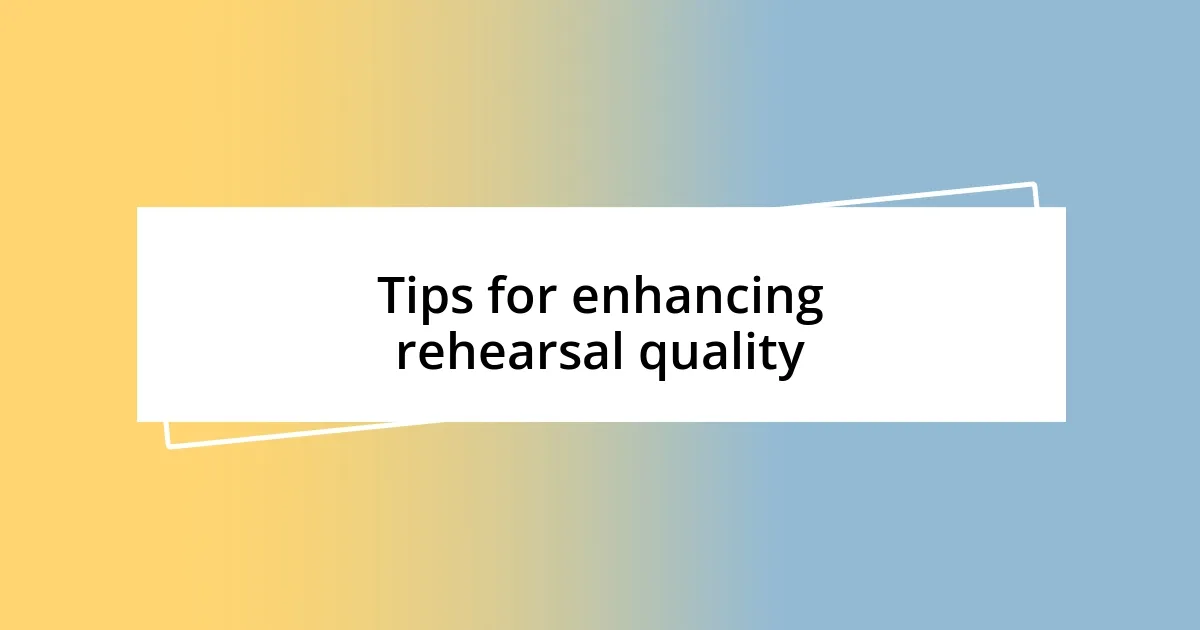
Tips for enhancing rehearsal quality
One of the best ways to enhance the quality of rehearsals is by establishing a clear structure for each session. I once joined a group where we began each rehearsal with a quick check-in—everyone shared their current emotions or challenges. This simple practice created a safe environment to express ourselves, revealing underlying tensions that could affect our performance. Have you ever noticed how emotional states can ripple through a rehearsal? By addressing those feelings upfront, we were able to dive into our scenes with a heightened sense of connection and focus.
In another instance, we set specific goals for each rehearsal, focusing on one key element at a time, like character development or timing. This unexpected approach kept our collective energy high and prevented us from feeling overwhelmed. Instead of trying to tackle everything, I found that honing in on one aspect made our practice feel more meaningful. Isn’t it interesting how narrowing our focus can actually broaden our creativity?
Lastly, I realized the importance of balancing rigor with playfulness. One day, feeling the pressure of an upcoming performance, I suggested we incorporate improvisation into our warm-up. The room lit up with laughter and spontaneity. It reminded me how vital it is to keep the joy in our craft, especially during stressful times. Have you experienced that sudden burst of inspiration that comes from just playing around? These lighthearted moments often lead to surprising breakthroughs, enriching the rehearsal experience and strengthening our ensemble.












